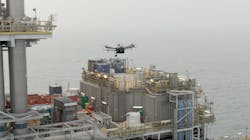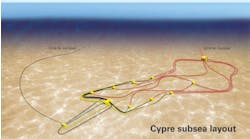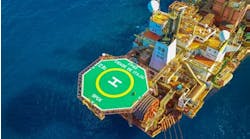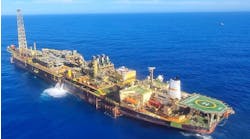Offshore staff
LONDON – Neptune Energy has completed a collaborative program with Environmental Defense Fund (EDF) to measure methane emissions on the Cygnus gas production platform in the UK southern North Sea.
EDF scientists coordinated the five-day study with a team from drone technology provider, Texo DSI, operating a rotary drone provided by Scientific Aviation.
The drone, which was fitted with sensing technology, measured emissions at various locations around the platform.
In parallel, an unmanned fixed-wing drone operated by Flylogix flew from Weybourne Airfield in Norfolk, with onboard methane measuring and analytics technology provided by SeekOps.
The aircraft circled overhead, starting at a point above the platform and gradually reducing to just above sea-level, recording the volume of emissions. The operation, which covered more than 313 mi (504 km), is thought to have been one of the longest of its type performed to date in the UK North Sea.
Neptune’s goals were to assess new methods for identifying and quantifying facility-level offshore methane emissions, and draw up actions to reduce them. Results of the study will be published in 2022.
Another aim was to set an accurate, scientific benchmark for measuring total methane emissions within an offshore environment to help develop best-practice approaches for the wider upstream sector.
Pete Jones, Neptune’s vice president Operations Europe, said: “Given the short lifespan of methane emissions, we know that taking meaningful action today can bring positive results in as little as nine years.
“Neptune already has one of the lowest methane intensities in the sector, at 0.01%, compared with the industry average of 0.23%, and has set a target of net zero methane emissions by 2030.
“Proactive action by the UK offshore industry including the reduction of flaring and venting contributed towards a 11% fall in upstream greenhouse gas emissions between 2018 and 2020. By using advanced, existing technologies and novel approaches such as those employed in this latest study, the UK sector can continue to lead the way in driving down methane emissions from oil and gas operations.”
Global investment firm, Carlyle, a shareholder in Neptune Energy, is supporting the project.
11/02/2021



